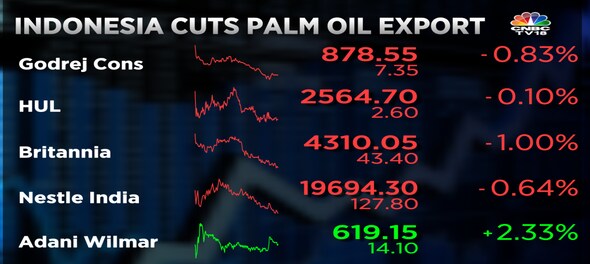
In order to ensure there was enough domestic supply, Indonesia would tighten export regulations for palm oil starting January 1 by allowing fewer exports outside for each tonne sold domestically, a government official said on Friday, according to news agency Reuters.
"To secure domestic supply, especially for the first quarter of 2023," said Septian Hario Setio, a senior official at coordinating ministry of maritime and investment affairs, in explaining the reason behind the policy change.
In contrast to the present ratio of eight times, which was confirmed by an industry official, exporters will now be permitted to ship six times their domestic sales volume.
Shares of Indian companies in the Fast Moving Consumer Goods sector are trading in red following the news. Hindustan Unilever shares are at Rs 2,565, down 0.08 percent, Britannia shares are down 0.8 percent, Godrej Consumers shares are at Rs 876 down 1.02 percent and Nestle India is down 0.5 percent.
Meanwhile Adani Wilmar shares are the only ones in the positive, up 1.87 percent, at Rs 616 on the BSE.
A brief ban on exports of the edible oil from Indonesia shook markets and exacerbated existing global supply concerns, but it also led to ballooning domestic inventory.
Also read: Palm oil prices slump to 20-month low — what’s hurting the commodity and aiding FMCG firms
Indonesia currently imposes a so-called domestic market obligation (DMO) requiring businesses to sell a portion of output locally in return for export permits.
Palm oil is used in everything from food products to detergents to cosmetics, hence its prices affect the prices of many goods. Earlier the Indonesian government had lifted the ban from Palm Oil in May, leading to a drop in palm oil rates and a rally in FMCG stocks.
“With Indonesia lifting up the ban and the Indian government pushing enterprises to reduce the maximum retail price of edible oils by Rs 15, palm prices are going to stay consolidated,” finance advisor, Manoj Kumar Jain told CNBC-TV18.com in July.
Indonesia is planning to increase the mandatory palm oil component to 35 percent starting February 1.
Also read: Palm oil prices expected to drop by more than 20 percent — here is how it will impact FMCG companies
Check out our in-depth Market Coverage, Business News & get real-time Stock Market Updates on CNBC-TV18. Also, Watch our channels CNBC-TV18, CNBC Awaaz and CNBC Bajar Live on-the-go!


Prajwal Revanna Sexual Assault Case: Activist raises concerns over political interference, delayed investigation in the matter
Apr 30, 2024 10:17 PM
Lok Sabha Election 2024: Baramati election outcome will decide the future of Pawar dynasty, says expert
Apr 30, 2024 10:08 PM
Lok Sabha elections 2024: Baramati to Mainpuri, key battles in phase 3
Apr 30, 2024 7:01 PM

